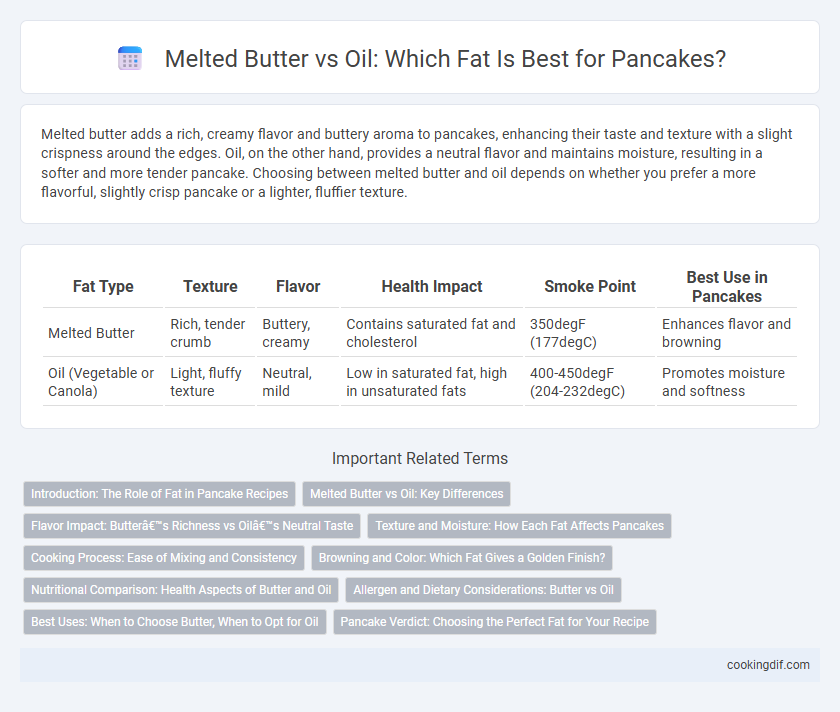Melted butter adds a rich, creamy flavor and buttery aroma to pancakes, enhancing their taste and texture with a slight crispness around the edges. Oil, on the other hand, provides a neutral flavor and maintains moisture, resulting in a softer and more tender pancake. Choosing between melted butter and oil depends on whether you prefer a more flavorful, slightly crisp pancake or a lighter, fluffier texture.
Table of Comparison
| Fat Type | Texture | Flavor | Health Impact | Smoke Point | Best Use in Pancakes |
|---|---|---|---|---|---|
| Melted Butter | Rich, tender crumb | Buttery, creamy | Contains saturated fat and cholesterol | 350degF (177degC) | Enhances flavor and browning |
| Oil (Vegetable or Canola) | Light, fluffy texture | Neutral, mild | Low in saturated fat, high in unsaturated fats | 400-450degF (204-232degC) | Promotes moisture and softness |
Introduction: The Role of Fat in Pancake Recipes
Fat in pancake recipes enhances texture, flavor, and moisture retention, with melted butter providing a rich, creamy taste and a slightly crisp edge. Oil offers a neutral flavor and promotes fluffy, tender pancakes by evenly distributing heat during cooking. Choosing the right fat impacts the pancake's mouthfeel and browning, making it essential for recipe optimization.
Melted Butter vs Oil: Key Differences
Melted butter offers a rich, creamy flavor and contributes to a tender pancake texture, while oil provides a neutral taste and creates a lighter, fluffier consistency. Butter contains milk solids that brown during cooking, enhancing flavor and creating a slightly crisp edge, whereas oil's higher smoke point helps prevent burning at high temperatures. Choosing between melted butter and oil depends on desired taste and texture, with melted butter favored for flavor depth and oil preferred for moisture retention.
Flavor Impact: Butter’s Richness vs Oil’s Neutral Taste
Melted butter imparts a rich, creamy flavor to pancakes that enhances their overall taste profile, creating a more indulgent and traditional experience. In contrast, oil offers a neutral taste that allows the other ingredients' flavors to stand out without adding additional richness. Choosing butter over oil significantly influences the pancake's flavor depth, making it a preferred fat for those seeking a buttery aroma and taste.
Texture and Moisture: How Each Fat Affects Pancakes
Melted butter imparts a rich, creamy flavor and contributes to a tender, slightly crisp texture in pancakes by adding moisture and promoting browning through the Maillard reaction. Oil, typically neutral-flavored vegetable or canola oil, creates a moister, denser pancake with a softer crumb due to its inability to solidify at room temperature, which retains moisture better. Choosing butter results in a more complex, buttery texture, while oil ensures consistent moisture and softness throughout the pancake.
Cooking Process: Ease of Mixing and Consistency
Melted butter enhances pancake batter by blending smoothly and incorporating rich flavor, creating a consistent texture throughout the cooking process. Oil, typically vegetable or canola, mixes easily due to its liquid state at room temperature, ensuring uniform moisture and a tender crumb. Butter's milk solids can slightly affect batter consistency, while oil maintains a more stable emulsion for even cooking and fluffiness.
Browning and Color: Which Fat Gives a Golden Finish?
Melted butter contributes to pancakes' superior browning and a rich golden color due to the presence of milk solids that caramelize during cooking, creating a flavorful crust. Oil, lacking these milk solids, results in a paler, less caramelized surface but offers a more neutral taste and higher smoke point. For a visually appealing golden finish with enhanced flavor, melted butter is the preferred fat choice in pancake preparation.
Nutritional Comparison: Health Aspects of Butter and Oil
Melted butter contains saturated fats and cholesterol, which can raise LDL cholesterol levels, while most oils, such as olive or canola oil, have higher amounts of heart-healthy monounsaturated and polyunsaturated fats. Butter provides fat-soluble vitamins A, D, E, and K, whereas oils may offer vitamin E and essential fatty acids like omega-3s and omega-6s depending on the source. Choosing oils with beneficial fatty acid profiles can support cardiovascular health better than butter's saturated fat content when used in pancake preparation.
Allergen and Dietary Considerations: Butter vs Oil
Melted butter contains dairy, which can trigger allergic reactions in individuals with lactose intolerance or milk allergies, while many oils like olive or coconut are dairy-free and often preferred for allergen-sensitive diets. Butter offers a natural source of saturated fat and fat-soluble vitamins like A and D, whereas oils provide varying types of unsaturated fats beneficial for heart health and are usually suitable for vegan and dairy-free dietary restrictions. Choosing between melted butter and oil depends on specific dietary needs and allergen sensitivities, influencing pancake recipes for diverse health requirements.
Best Uses: When to Choose Butter, When to Opt for Oil
Melted butter provides a rich, creamy flavor and crispy edges, making it ideal for classic breakfast pancakes and recipes that benefit from a buttery aroma. Oil, such as vegetable or canola, offers a neutral taste and higher smoke point, perfect for fluffy pancakes requiring moisture without added flavor. Choose butter for indulgent, flavorful stacks and oil for light, tender pancakes with consistent texture.
Pancake Verdict: Choosing the Perfect Fat for Your Recipe
Melted butter imparts a rich, creamy flavor and golden browning to pancakes, enhancing their taste and texture with a slightly crispy edge. Oil, being neutral in flavor, allows the batter's natural ingredients like vanilla or cinnamon to shine while maintaining a moist, tender crumb. For optimal pancakes, melted butter is favored for flavor and texture, whereas oil is preferred for simplicity and moisture retention in the final stack.
Melted butter vs oil for fat Infographic

 cookingdif.com
cookingdif.com